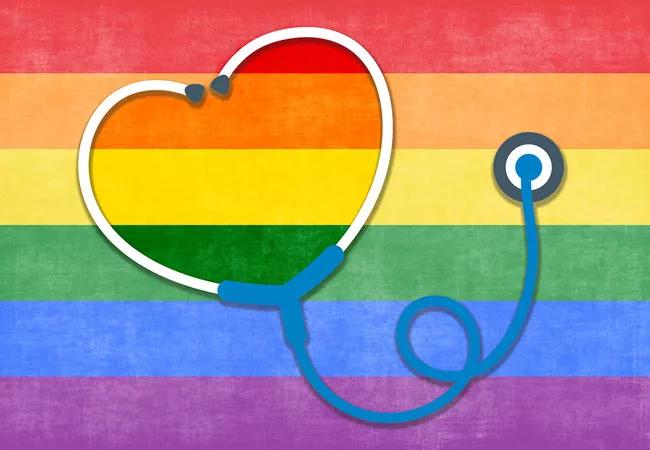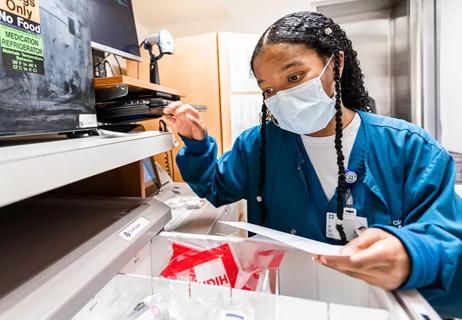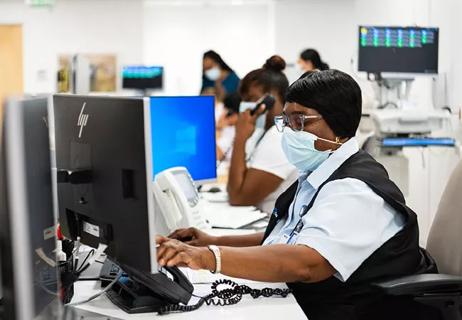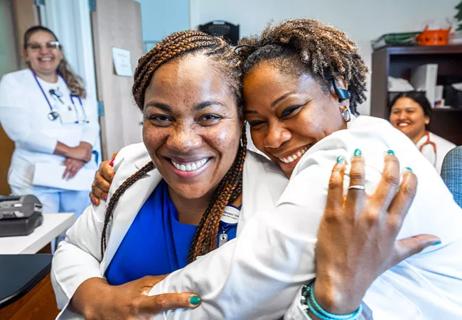Advertisement
How to promote equitable and inclusive care

By K. Kelly Hancock, DNP, RN, NE-BC, FAAN, Chief Caregiver Officer
Advertisement
Cleveland Clinic is a non-profit academic medical center. Advertising on our site helps support our mission. We do not endorse non-Cleveland Clinic products or services. Policy
Providing equitable and inclusive care for LGBTQ+ patients and employees is a top priority for healthcare organizations. The LGBTQ+ community has historically experienced discrimination, deterring people from getting the healthcare they need when they need it. Discrimination has created notable health disparities for this patient population.
According to Lambda Legal’s “When Health Care Isn’t Caring” study, 73% of transgender respondents and 29% of lesbian, gay and bisexual respondents said that they felt they would be treated differently by medical professionals because of their LGBTQ+ status. Seventy percent of transgender/gender non-conforming patients and 56% of lesbian, gay and bisexual patients said they had experienced some type of discrimination in healthcare.
A decade ago, The Joint Commission (TJC) issued a standard that required hospitals to prohibit discrimination based on sexual orientation and gender identity. A few years later, reports from TJC and the Institute of Medicine called for further action to address the inequalities of LGBTQ+ care, reduce disparities and ensure inclusive care. Hundreds of organizations began participating in the Healthcare Equality Index (HEI), which guides hospitals on providing equitable care.
HEI participants receive annual scores based on how many LGBTQ+-inclusive policies and practices they have in place. The highest of these is the Leader in LGBT Healthcare Equality designation. Ten participating Cleveland Clinic locations earned the Leader designation in 2021.
Advertisement
In working toward the designation, we followed recommendations from the Human Rights Campaign (the organization that administers the HEI) and aligned our efforts with HEI’s scoring criteria: non-discrimination and staff training, patient services and support, employee benefits and policies, and patient and community engagement. Organizations that do the same can improve LGBTQ+ patient care and enhance their commitment to ensuring healthcare equality and inclusion for all.
LGBTQ+ inclusive policies are imperative. Cleveland Clinic has standard policies on caregiver and patient non-discrimination, equal visitation, employee benefits and equal employment opportunities, staff training opportunities and more. These are posted online, communicated by leaders and discussed with employees and patients.
The equal visitation policy, for example, ensures that same sex couples, same-sex parents and others in the LGBTQ+ community have the same opportunities as non-LGBTQ+ individuals to visit or accompany loved ones in healthcare settings. Other policies protect employees from discrimination in the workplace and ensure that equal employment opportunities are given in hiring, promotion, compensation and retirement.
Policies are only effective if they are known, therefore it is important that organizations communicate about them regularly to employees and patients.
To further support inclusive policy implementation, staff training is provided. Every Cleveland Clinic facility that participates in the HEI must complete at least 50 hours of approved LGBTQ+ patient-centered care education. Doing so helps patients feel more comfortable with their care providers and makes them more likely to seek care when they need it. In 2021, our employees logged a total of 1,985 hours of LGBTQ+-related training.
Advertisement
Implementing best practices that support the LGBTQ+ community enhances care for patients. Best practices may include establishing an internal planning or advisory committee that addresses care challenges and opportunities, developing a strategic plan for reducing LGBTQ+ health disparities, having communication resources to inform patients of LGBTQ+ providers and services, and establishing LGBTQ+ patient advocates or an ombudsman.
LGBTQ+ patients may have specific health risks, so addressing these in a safe and comfortable environment by experienced and knowledgeable providers and specialists is key. Cleveland Clinic’s Center for LGBT Care is our hub for lesbian, gay, bisexual and transgender patients. Center staff and specialists complete additional LGBTQ+ inclusion training to better understand the health needs of LGBTQ+ patients and are experts in LGBTQ+ care.
Taking a holistic approach when capturing medical data for LGBTQ+ patients is essential. Electronic Health Record (EHR) data entry tools have been integrated systemwide at Cleveland Clinic to capture both sexual orientation and gender identity information. As a result, we are able to provide more inclusive and comprehensive care. For example, data fields that indicate a patient has transitioned from one sex to the other but kept their previous sex organs ensures the patient receives proper preventive care screenings. These tools also offer providers necessary details to help them respectfully address patients by preferred names and pronouns.
Advertisement
Healthcare organizations have traditionally been slower to embrace some benefits for LGBTQ+ employees, such as insurance coverage for gender affirmation surgery.
In a study by the Williams Institute, 60% of employers who offer gender affirmation healthcare coverage said that providing inclusive health coverage makes them more competitive and improves recruitment and retention. They also said it increases employee satisfaction and morale and helps attract a diverse workforce.
At Cleveland Clinic, providing such benefits for LGBTQ+ employees supports our inclusion-driven culture that intentionally creates a compassionate environment of belonging where all are valued and respected. Our caregiver gender transition guidelines were adopted in 2019 and outline the process and available tools – from developing a caregiver transition team to offer support and guidance to creating a communications plan to share with managers and co-workers. Providing such organizational support leads to increased employee engagement.
Increasing awareness about the need of policies like these frequently comes from employee resource groups like Cleveland Clinic’s ClinicPride, which is dedicated to supporting LGBTQ+ caregivers and identifying opportunities to improve LGBTQ+ care throughout the organization. In addition to offering feedback on organizational policies and practices, the group identifies areas of priority, such as engagement and community outreach. They monitor changes in local, state and federal legislation.
Advertisement
Organizations that wish to make strides in LGBTQ+ care should also encourage employees to join local governing and community advisory boards.
Enhancing LGBTQ+ inclusion also comes by supporting the LGBTQ+ community through events, PRIDE celebrations, programs and health fairs. Cleveland Clinic often collaborates with local LGBTQ+ organizations and community centers to offer free health screenings. Through these, we increase access to care and address health disparities, which have been exacerbated by the pandemic.
For communications about events like these — and to signal an institution’s genuine policy and practice of inclusivity — it can be helpful to develop diverse and inclusive LGBTQ+-friendly imagery and language for marketing and advertising materials, including social media. Messaging alone is not sufficient; it must be backed up by an integrated program to ensure that LGBTQ+ patients and caregivers always feel safe and welcome. But it’s important to ensure that these policies and programs are being well communicated inside and outside of the organization.
At the patient level, engagement is best achieved when organizations seek to understand the needs of their LGBTQ+ patients. Patient surveys, focus groups, meetings and other forms of ongoing communication and outreach will ensure that you are remaining in touch – that you can identify opportunities for improvement and know that you’re on the right track.
As healthcare organizations continue to make changes that promise comprehensive and compassionate care for every patient — regardless of sexual orientation or gender identity — we will eliminate long-standing LGBTQ+ health disparities and create a more inclusive healthcare system for all.
Advertisement

Community outreach strengthens Cleveland Clinic’s commitment to patient-centered care, building a representative workforce

The Black Heritage Employee Resource Group reflects a broader spectrum of caregivers

Re-imagine hiring and growth models

Cleveland Clinic awarded for its efforts

Programs and partnerships focus on community, diverse hiring

Online course supports emotional well-being

Initiative recognizes excellence, strengthens alumni engagement

Initiative fosters waste reduction and skill development